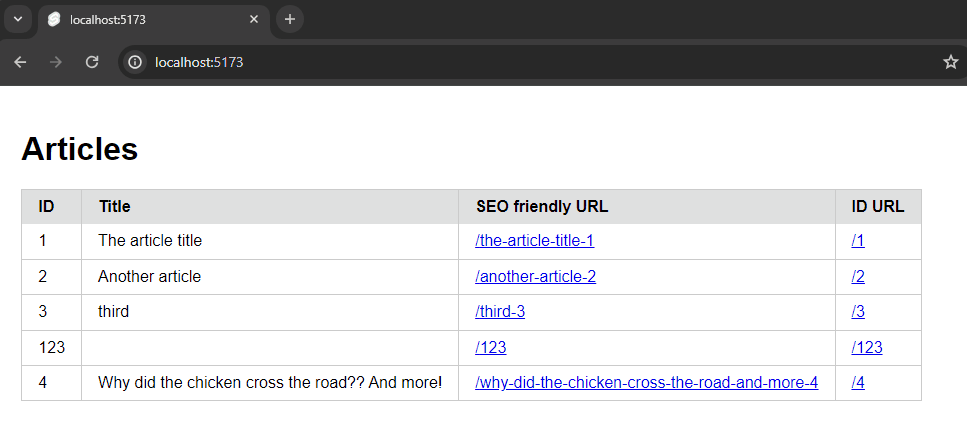svelte-selfheal v0.1.0
svelte-selfheal
A simple Svelte package inspired by this video from Aaron Francis and heavily based on a similar package for Laravel.
It allows you to redirect users to a canonical and SEO-friendly URL for a page, even if the slug is altered at any point or doesn't exist at all.

Example
Canonical URL: https://my-app.com/blog/my-fancy-title-5312
The following URLs would still redirect to the correct page
/blog/my-fancy-title-5312(original)/blog/my-fancy-but-spelled-wrong-title-5312/blog/5312/blog/-5312/blog/THIS should NOT be r3alURL -5312
Installation
Install this package using any of the popular package managers.
npm i svelte-selfhealpnpm add svelte-selfhealyarn add svelte-selfhealUsage
Once installed, export a healer:
import { selfheal } from 'svelte-selfheal';
export const healer = selfheal();Now you can use the self-healing functions anywhere across your app.
Example +page.server.ts
Inside your load function you want to
- Import the
healerand destructure the most important functions
const { identifier, shouldRedirect, reroute, create } = healer;- Separate the identifier from the slug using the handler you defined on creation
const { identifier: id } = identifier.separate(params.id);- Query the database using the ID and see if something is found
const article = db.articles.find((article) => String(article.id) === id);
if (!article) throw error(404, `Article ${identifier} not found`);- Compare the DB slug to your current URL (and redirect if they're differerent)
const slug = create(article.title, article.id);
// You can either use the built-in rerouter
reroute(slug, params.id);
// Or manually check and handle the error yourself
if (shouldRedirect(slug, params.id)) throw redirect(301, slug);Now you are guaranteed to either be on the 404 page because no content with that ID is found or you have been redirected to use the canonical slug for this entity.
Complete example
import { error, redirect } from '@sveltejs/kit';
import type { PageServerLoad } from './$types.js';
import { healer } from '$lib/selfheal.js';
import { db } from '$lib/db.js';
export const load: PageServerLoad = async ({ params }) => {
const { identifier, shouldRedirect, reroute, create } = healer;
const { identifier: id } = identifier.separate(params.id);
const article = db.articles.find((article) => String(article.id) === id);
if (!article) throw error(404, `Article ${identifier} not found`);
const slug = create(article.title, article.id);
reroute(slug, params.id); // or throw manually
if (shouldRedirect(slug, params.id)) throw redirect(301, slug);
return { article, slug: params.id };
};Don't worry if your "slug" isn't URL friendly; the package will take care of
formatting it for you whenever you call create(). In fact, it doesn't even have to be unique because the
defined unique identifier for your model will also be included at the end.
Limitations
By default, the package requires that your unique identifier (such as the id or uuid column)
not have any - characters. You can implement your own IdentifierHandler as detailed in the next section.
As of now, all URL parameters are removed during redirect but this will be fixed in a future release.
Configuration
During initialization you can configure the healer by passing in functions to handle its operations, or use its sensible defaults.
By default, the package uses
| Function | Method | Description |
|---|---|---|
| sanitize() | Kebab | Trims, replaces spaces with hyphens, removes multiple hyphens, removes hyphens at the start and end of the string and converts to lowercase |
| shouldRedirect() && reroute() | Name | Compares the canonical and current routes by their names using a simple === |
| identifier() | Hyphen | Appends the ID to the slug using a hyphen - |
You can however change any of these individually, within the limitations mentioned above.
export const healer = selfheal({
sanitize: (slug) => {
/* ... */
},
identifier: {
join(slug, identifier) {
/* ... */
},
separate(slug) {
/* ... */
}
},
shouldRedirect: (slug, identifier) => {
/* ... */
},
reroute: (slug, identifier) => {
/* ... */
}
});Using a custom IdentifierHandler
If you need to customize how a slug is joined to a model identifier (which by default is just a hyphen),
you can create your own IdentifierHandler that returns a join() and a separate() function and supply itduring the initialization of your healer.
Here is an example using a _ instead
export const healer = selfheal({
identifier: {
join(slug, identifier) {
return `${slug}_${identifier}`;
},
separate(slug) {
const [identifier, ...rest] = slug.split('_').reverse();
return {
identifier,
slug: rest.reverse().join('_')
};
}
}
});This would result in URLs like /my-fancy-title_123, depending of course on how your sanitizer works.
License
Licensed under the MIT license.